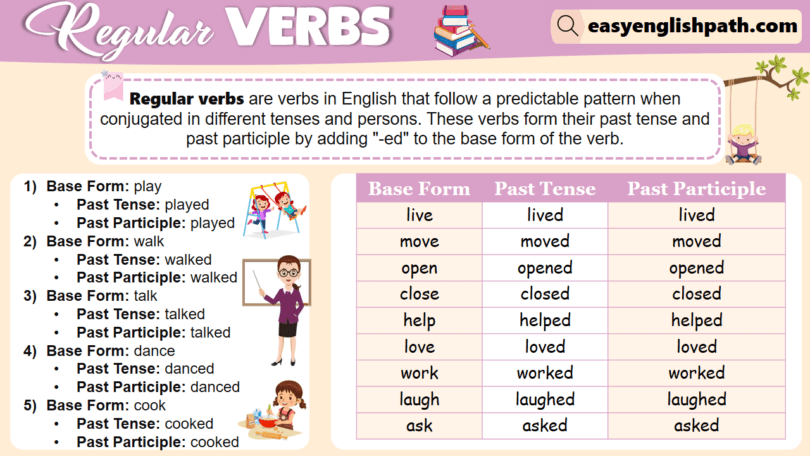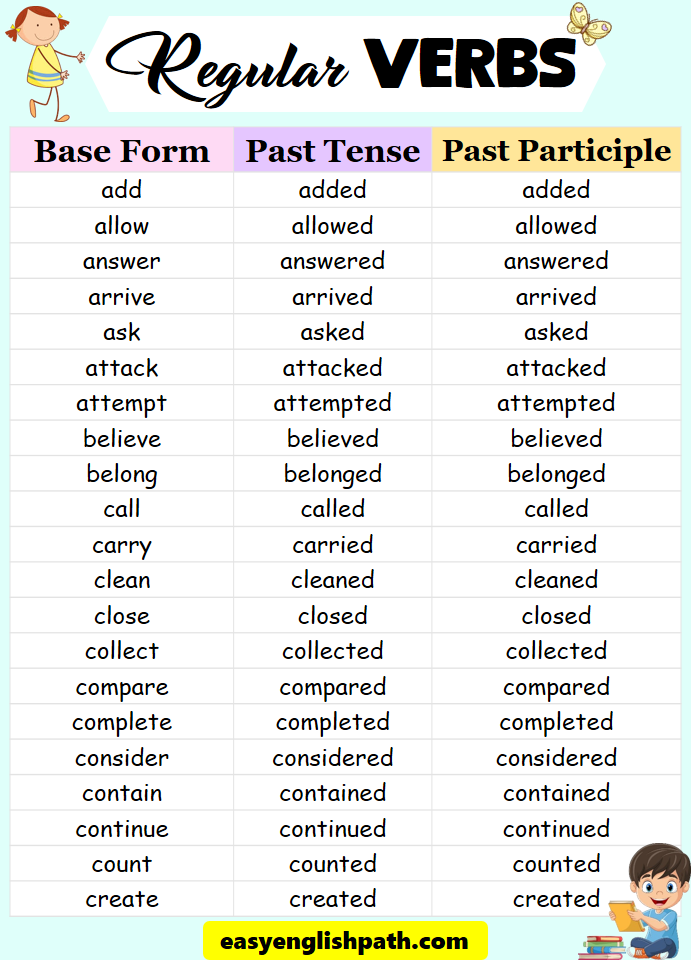Regular verbs follow a simple pattern and do not change in unexpected ways. To form the past tense, you just add “-ed” or “-d” to the base verb. Learning regular verbs makes it easier to speak and write correctly. Once you understand them, forming sentences becomes much simpler in any language.
What are Regular Verbs?
Regular verbs are verbs that follow a consistent pattern when forming their past tense and past participle. They simply add “-ed” or “-d” to the base form, without changing the verb’s spelling significantly.
For example:
- Base Form → Past Tense → Past Participle
- Walk → Walked → Walked
- Play → Played → Played
- Clean → Cleaned → Cleaned
List of Regular Verbs
| Base Form | Past Tense | Past Participle |
| add | added | added |
| allow | allowed | allowed |
| answer | answered | answered |
| arrive | arrived | arrived |
| ask | asked | asked |
| attack | attacked | attacked |
| attempt | attempted | attempted |
| believe | believed | believed |
| belong | belonged | belonged |
| call | called | called |
| carry | carried | carried |
| clean | cleaned | cleaned |
| close | closed | closed |
| collect | collected | collected |
| compare | compared | compared |
| complete | completed | completed |
| consider | considered | considered |
| contain | contained | contained |
| continue | continued | continued |
| count | counted | counted |
| create | created | created |
Regular Verb vs Irregular Verb
| Feature | Regular Verbs | Irregular Verbs |
|---|---|---|
| Definition | Verbs that follow a consistent pattern when forming past tense and past participle. | Verbs that do not follow a fixed pattern when forming past tense and past participle. |
| Past Tense Rule | Add -ed or -d to the base form. | Changes vary; may involve vowel changes or entirely different words. |
| Past Participle Rule | Same as past tense (e.g., play → played → played). | May be different from past tense (e.g., go → went → gone). |
| Examples | Walk → Walked Talk → Talked Love → Loved | Go → Went → Gone Eat → Ate → Eaten Write → Wrote → Written |
Regular Verb Example Sentences
- She walked to school every day.
- They talked about their plans for the weekend.
- He played soccer with his friends yesterday.
- We watched a movie last night.
- I cooked dinner for my family.
- She danced gracefully at the party.
- They laughed at the funny joke.
- He cleaned his room before guests arrived.
- We helped our neighbor move furniture.
- She painted a beautiful picture in art class.
Importance of Learning Regular Verbs
- Makes Communication Easier – Regular verbs follow a simple pattern, making it easier to form sentences correctly.
- Helps in Writing and Speaking – Knowing regular verbs improves both written and spoken language skills.
- Builds a Strong Grammar Foundation – Understanding regular verbs helps in learning other grammar rules more easily.
- Reduces Mistakes – Since regular verbs follow a fixed pattern, they are easier to remember and use correctly.
- Boosts Confidence – When you know how to use verbs properly, you feel more confident in conversations and writing.
FAQS
1. What are regular verbs?
Regular verbs are verbs that follow a fixed pattern when forming their past tense by adding -ed or -d (e.g., walk → walked).
2. How do regular verbs differ from irregular verbs?
Regular verbs follow a consistent pattern, while irregular verbs change in unpredictable ways (e.g., go → went).
3. Why is learning regular verbs important?
They make forming sentences easier, improve grammar, and help in both speaking and writing correctly.
4. What are some common regular verbs?
Examples include play → played, talk → talked, work → worked, and love → loved.
You May Also Like this






